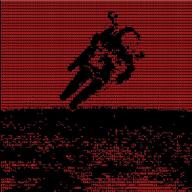This time we just get a single binary. Running the binary says this:
$ ./flag
I will malloc() and strcpy the flag there. take it.So let’s open the program in pwndbg and walk through it.
Well it seems that there are no symbols defined… Weird.
pwndbg> info func
All defined functions:Running checksec on the binary shows that there is no PIE, so addresses will be static, but it does appear to be packed so let’s try unpacking it:
$ checksec flag
Arch: amd64-64-little
RELRO: No RELRO
Stack: No canary found
NX: NX unknown - GNU_STACK missing
PIE: No PIE (0x400000)
Stack: Executable
RWX: Has RWX segments
Packer: Packed with UPXThat worked:
$ upx -d flag
Ultimate Packer for eXecutables
Copyright (C) 1996 - 2024
UPX 4.2.3 Markus Oberhumer, Laszlo Molnar & John Reiser Mar 27th 2024
File size Ratio Format Name
-------------------- ------ ----------- -----------
887219 <- 335288 37.79% linux/amd64 flag
Unpacked 1 file.Now running info func gives a lot more functions:
pwndbg> info func
All defined functions:
Non-debugging symbols:
0x00000000004002f8 _init
0x00000000004003d0 check_one_fd.part
0x0000000000400441 munmap_chunk.part
0x0000000000400455 group_number
0x0000000000400557 _i18n_number_rewrite
0x000000000040073c _i18n_number_rewrite
0x0000000000400921 is_trusted_path_normalize
0x0000000000400a1a print_search_path
0x0000000000400b69 strip
0x0000000000400bd9 group_number
0x0000000000400ca3 _i18n_number_rewrite
0x0000000000400dd0 fini
0x0000000000400de0 init_cacheinfo
0x0000000000401058 _start
0x0000000000401084 call_gmon_start
0x00000000004010a0 __do_global_dtors_aux
0x0000000000401120 frame_dummy
0x0000000000401164 main
...Okay so let’s set a breakpoint at main and see if we catch the strcpy call. It looks like when we get to address 0x401195 that this is the call to strcpy and the string is there in memory which pwndbg helpfully shows for us so that is probably the flag:
RAX 0x6c96b0 ◂— 0x0
RBX 0x401ae0 (__libc_csu_fini) ◂— push rbx
RCX 0x8
RDX 0x496628 ◂— push rbp /* '<FLAG>' */
*RDI 0x6c96b0 ◂— 0x0
RSI 0x496628 ◂— push rbp /* '<FLAG>' */
R8 0x1
R9 0x3
R10 0x22
R11 0x0
R12 0x401a50 (__libc_csu_init) ◂— push r14
R13 0x0
R14 0x0
R15 0x0
RBP 0x7fffffffcad0 ◂— 0x0
RSP 0x7fffffffcac0 —▸ 0x401a50 (__libc_csu_init) ◂— push r14
*RIP 0x401195 (main+49) ◂— call 400320h
─────────────────────────────────────[ DISASM / x86-64 / set emulate on ]──────────────────────────────────────
0x401180 <main+28> mov qword ptr [rbp - 8], rax
0x401184 <main+32> mov rdx, qword ptr [rip + 2c0ee5h]
0x40118b <main+39> mov rax, qword ptr [rbp - 8]
0x40118f <main+43> mov rsi, rdx
0x401192 <main+46> mov rdi, rax
> 0x401195 <main+49> call 400320h <0x400320>Submitting this works. You can also find the flag very easily after unpacking it by doing:
strings -n40 flagThen the flag is the first string. I thought it was more fun to step through the program though.

